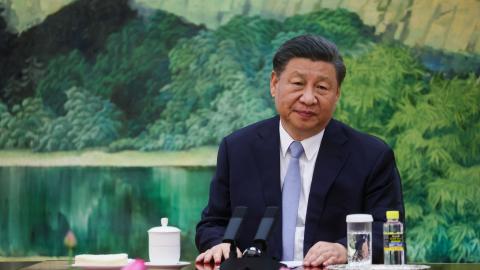Even if the mutiny by Yevgeny Prigozhin against the Russian military establishment is truly over, Vladimir Putin’s authority is terminally wounded and the dissolution of the Russian Federation is no longer unthinkable.
While China has since voiced support for its “strategic partner,” Xi Jinping will not want to replicate Putin’s errors. Which raises the question: if we take Xi at his word that he will use all necessary means, including force, to seize Taiwan, are Putin’s problems an indication of what might befall the Chinese leader if he follows the same destructive path?
History suggests that defeat in war presents an existential danger to the dictator. This is unsurprising as in a system where power is centralised around oneself, the decision to use force is generally made by an individual who bathes in glory when things go well and bears total blame when they do not. In this sense, Putin has done Xi a favour by reminding the latter what happens to dictators when hubris leads to recklessness and, ultimately, failure.
In important respects Xi is better prepared than Putin when it comes to entrenching and preserving personal power and avoiding coups. Xi’s anticorruption purges have always been more about empowering loyalists than about eliminating graft. With respect to the military, hundreds of generals and other senior officers have been removed and replaced by those offering allegiance to Xi rather than political and factional rivals.
Unlike in Russia, all soldiers in the People’s Liberation Army have sworn loyalty to the Chinese Communist Party rather than the Chinese nation since its inception in 1947. Xi has taken it one step further by forcing all soldiers to swear loyalty to their commander-in-chief personally, who of course is Xi. Moreover, commissars in charge of propaganda and ideology as dictated by Xi have spread throughout all levels of the military. There are party committees at all levels and in all institutions of the PLA. Indeed, there is a political dossier for virtually every soldier and officer that includes assessments of their loyalty and attitude towards their commander-inchief, official ideological doctrine known as Xi Jinping Thought and the CCP more broadly.
Additionally, Xi has less need to rely on unpredictable mercenaries the way Putin did with the Wagner Group. More than this, Xi has extra layers of assurance in the form of military trained and armed internal security entities such as the People’s Armed Police.
Like the PLA, the PAP and other bodies swear allegiance to Xi and the party in promising to defend and uphold the country’s one-party system. Since 2014, Chinese spending on such internal safety has exceeded that allocated to national defence.
One further element of Xi’s coup-proofing system is the establishment of numerous and competing centres of military, paramilitary and bureaucratic power operating underneath powerful committees and working groups controlled by Xi. The idea is to prevent any one person or organisation from gaining too much influence at Xi’s expense. Clearly, Xi comes from a stronger place than Putin.
But this does not mean the Chinese leader will sleep well or easily at night. Xi needs historical triumphs to remain the all-powerful dictator and has all but promised that Taiwan will be delivered to the mainland under his rule. He promotes and oversees the unprecedented expansion of China’s military might to make the case that he is uniquely placed to return China to pre-eminence. In geostrategic terms, that begins with taking Taiwan through diplomacy or, failing that, coercion and war.
This is why Putin’s problems must be worrisome for Xi. To be fair, Xi came to power with the realisation that the PLA lacked the capability and human expertise to prevail in a modern, hi-tech war.
But having come to this assessment, and despite spending hundreds of billions on modernisation, Xi has quickly created a system in which honest and reliable strategic, tactical and operational information and intelligence are found wanting. Promoting loyalists or sycophants has done that.
Making or destroying careers at all levels of the military and government based on whether reporting aligns with the dictator’s wishes and mandatory targets silences necessary nay-sayers within that system.
In short, Xi will not want to repeat Putin’s errors but will find it difficult to avoid the dictator’s curse that comes from suppressing and disincentivising the telling of truth and facts. Despite all efforts to preserve personal power, few dictators survive national failure and disaster. And Xi is well aware that the PLA has not conducted a major military operation since 1979 or engaged in amphibious landings under war conditions for more than 70 years.
This is not to say the PLA is a paper tiger. It clearly is not. But we do not know whether Xi is over-estimating or underestimating China’s military prowess, and Xi is probably as much in the dark on this issue as well. Regardless, the point of countries rearming quickly and specifically to counter the PLA is to credibly demonstrate to Xi that war will be a disaster for the CCP and therefore an existential moment for the Chinese leader.
Xi and Putin referred to each other as “dear friends” in March and reiterated support for the other’s objectives in Ukraine and Taiwan. If so, let’s link Ukraine with Taiwan and remind the Chinese leader that one friend need not make the same terrible mistake as the other.

















